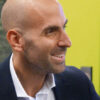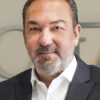In the intricate tapestry of industries and professions, the realm of labor and employment serves as the backbone of our global economy. From the dynamic landscapes of telecommunications and banking to the unique challenges posed by industries such as brewing, energy, and defense, the spectrum of experiences within the workforce is vast and varied.
In this special Thought Leaders feature, Dr. Venetia Koussia, Chair of the AmCham Greece Employment Committee, interviews a selection of industry leaders—each of them a seasoned professional at the forefront of their respective domain, as well as an Employment Committee member— to discover their different approaches to labor and employment. The interviews shed light on the challenges and opportunities that define their leadership roles, highlight the most sought after skills, experience and qualities in each field, and explore how each of our Thought Leaders builds on their membership in the Employment Committee to contribute toward improving employment relations and help prepare the next generation of Greek professionals for the ever-evolving job market.
Join us as we unravel the complexities of the labor landscape, offering a glimpse into the minds of those shaping the way we work and thrive in a rapidly changing world.
In today’s dynamic global economy, the field of labor and employment presents both significant challenges as well as promising opportunities for businesses. On the one hand, companies are grappling with a rapidly evolving labor landscape defined by rapid technological advancements, automation, remote working, and the gig economy. The integration of AI and automation is giving rise to concerns about job displacement, demanding a reevaluation of traditional skill sets, and the rise of remote work, accelerated by the COVID-19 pandemic, has introduced new considerations for managing and engaging a dispersed workforce. At the same time, businesses also face challenges in navigating complex labor laws and regulations, both domestically and internationally.
On the other hand, these challenges offer opportunities for innovation and adaptation. Companies can leverage technology to streamline processes, enhance productivity, and foster a more flexible work environment. Embracing diversity and inclusion initiatives not only addresses societal concerns but can also lead to a more creative and resilient workforce. Successful businesses recognize the need for continuous learning and upskilling to align with the evolving demands of the job market.
The AmCham Greece Employment Committee stays up-to-date with the ins and outs of the labor market and strives to strike a balance between addressing challenges and capitalizing on opportunities—a balance that is crucial for businesses seeking to thrive in today’s labor and employment landscape, in our country and beyond our borders alike.
—Nikolaos Bakatselos, President, The American-Hellenic Chamber of Commerce
Traditionally Greece has been characterized as a low performing labor market player vis-à-vis investors witnessing both the brain drain and brain waste phenomena.
Over the past two or three decades, the country faced many challenges that urgently needed a sustainable response, which requires more than just FDI-driven economic growth. The current government has been trying to create an attractive business environment, empowering it with technological solutions to create higher efficiencies, productivity and competitiveness.
But on top of that, Greece needs a holistic and comprehensive mechanism to produce more evidence-based policies in training, education, and labor market efficiency. The Greek workforce is ageing, and since the 1990s has no longer been selected as a low cost labor provider. We urgently need to enable, attract, grow, retain, and enhance the employability of Greek talent and become a global hub for knowledge skills where innovation and creativity can be cultivated.
The AmCham Greece Employment Committee focuses on analyzing and understanding current trends and the alternatives available to Greek organizations, suggesting various case studies, and basically raising the questions that need to be answered in a holistic approach by all market participants.
—Dr. Venetia Koussia, Chair of the AmCham Greece Employment Committee

Succeeding in The Human Age
Vassilis Karayannis, Special Advisor to the Board of Directors, ELVO – Hellenic Vehicle Industry (2020)
First things first, can you introduce yourself and tell us a bit about yourself and your background, leading to your current role, and about the company you work for?
It is commonly believed that we live in an era of interdependence, in which the global economy is significantly impacted by high volatility in energy and geopolitics. I can confirm this, from the point of view of (a) a legal representative of ELVO – Hellenic Vehicle Industry 2020, the Greek defense company that was formed following the acquisition of the assets of the former state-owned defense company ELVO by the prominent global Israeli defense companies Plasan Sasa Ltd and SK Group SA, (b) an independent BoD member of the Hellenic Energy Exchange (until recently), and (c) a former international banker at Citi’s Treasury.
The Employment Committee serves as a hub for formulating policies to enhance the Greek labor market’s competitiveness
How does your extensive experience in the banking, defense, and energy sectors, each of which has distinct labor and employment considerations, inform your approach to workforce management? Can you share some examples of strategies you’ve implemented to navigate the complexities of employment practices, diversity, and regulatory compliance while leading teams across these industries?
We live in the Human Age, an era in which competitive advantage is built mainly on the quality of the human factor, competencies, and skills. During my career, I have not only managed foreign direct investments (ELVO), the introduction of new businesses (Citi), and the launch of a new energy trading platform (HEnEX) but have also dealt with cultural change and the establishment of competitive HR practices in former state-owned monopolies.
After decades of de-industrialization, Greece has now returned to a growth trajectory in industry. However, industrial companies have been facing significant challenges that are not related to the level of taxation but to the overall business environment and specifically to the skills mismatch in the local labor market.
It’s a myth that Greece is rich in talent and skilled employees. The situation deteriorated due to population aging and the political instability of the previous decade which triggered significant brain drain. Unless we address this issue, economic growth won’t be sustainable.
It is true that Greece’s education system isn’t competitive and requires radical re-establishment. It is not only the poor scores of Greek students on PISA that confirm this but the skills mismatch as well. The solution is not a matter of governmental policies only. The issue represents a cultural shift. When students prefer being DJs, influencers, or waiters instead of acquiring technical skills that can provide them with a better income in a more sustainable way, this is a cultural issue that requires special management.
What does being a member of the AmCham Greece Employment Committee mean to you? How does the Committee contribute to the success of businesses and the workforce in our country?
I perceive my participation in the Employment Committee as mutually beneficial and extremely productive. The Employment Committee serves as a forum for the exchange of views on matters relating to employment and it also serves as a hub for formulating policies to enhance the Greek labor market’s competitiveness.

Managing and Engaging GenZ
Konstantinos Kintzios, Deputy Director, ReGeneration
Tell us a bit about yourself, your background, your current position, and the company you work for.
I hold a Bachelor’s and MBA from Deree – The American College of Greece, with nearly two decades of professional experience in the Greek market. Since 2017, I have had the privilege of leading ReGeneration, one of the most significant non-profit initiatives in Greece, democratizing opportunity for Greek youth by catalyzing the up- and reskilling revolution, empowering the next generation of young professionals to thrive in the Globalization 4.0 era and dream a better future. ReGeneration has achieved impressive results: 4,000 placements of graduates in a network of 2,000 companies across Greece and over one million training hours delivered to equip individuals with both soft and hard skills necessary for success. Our overarching mission? To reduce Greece’s brain drain, enhance youth employability, and bridge the gap between young graduates and companies, thereby investing in the next generation.
By aligning my personal values with ReGeneration’s mission, I emphasize a civic duty mindset, embracing JFK’s, “Ask not what your country can do for you – ask what you can do for your country” as my guiding principle in making a positive impact, daily. That’s always my why.
So what’s your approach to empowering the next generation of young professionals?
OK, let’s face it. GenZ isn’t the easiest generation to work with. As companies fight economic uncertainty, layoffs, and return-to-office plans, they face the significant challenge of engaging and managing the incoming GenZ workforce. By 2025, GenZ is expected to comprise one third of the workforce, requiring a distinct approach in attracting, managing, and retaining workers. While GenZ possesses strong technological skills, there is a noted lack of certain competencies, especially in interpersonal or soft skills. To succeed with this generation, companies must adapt their interaction methods in the workplace, leveraging tech tools such as ChatGPT and social media platforms. Additionally, mentorship programs and fostering a positive organizational culture are crucial components in effectively working with GenZ.
Youth is the future
Don’t underestimate youngsters’ tech skills! While entering the workforce with native digital skills, GenZ faces challenges regarding in-person communication and interpersonal dynamics. To effectively manage them, companies should adapt to their communication preferences. In return, GenZ offers valuable expertise in social media and emerging AI tools like ChatGPT. Companies risk missing out on a significant opportunity if they don’t leverage the unique skills of this generation. Moreover, with ongoing technological advancements, companies are encouraged to proactively integrate Gen Z into the workforce as this generation sees such changes as normal, and capitalizing on their tech-centric skillset is considered a smart business decision.
My values, your values, our values! GenZ places significant importance on company values aligning with their personal values, making it a leading influence on their job satisfaction. If company culture doesn’t meet their expectations, GenZ-ers will likely leave. Unlike previous generations, traditional perks are not enough; GenZ also seeks employers who are good and active global citizens. Valuing self-care, mental health, and global issues, GenZ employees are disincentivized by a company culture that neglects these aspects.
Recognizing that youth is the future, the key to shaping a substantive culture lies in understanding and supporting this different, dynamic, and gifted generation. It goes beyond mere declarations on walls; hope for the future hinges on genuine engagement with the unique qualities of GenZ.
What about the Employment Committee? How does it work relate to GenZ and improving the labor landscape in Greece?
The Committee represents a cornerstone organization in the 4IR era, acting as a dynamic think tank and influential policy shaper, able to bridge the gap between workforce needs and governmental strategies. A primary goal is to integrate GenZ into the business landscape, recognizing them as both a significant future workforce and a catalyst for transformative change. The focus is on developing strategies that resonate with GenZ, revitalizing traditional Greek business culture. The aim is to shift our focus from a purely metric-driven perspective (‘the KPIs behind the people’) to a more human-centric approach (‘the people behind the KPIs’), creating a business environment with meaningful values and fostering a more inclusive and dynamic business culture in Greece.

Empowering a Strong, Inclusive and Sustainable Workforce
Eugenia Melea, Head of HR Europe, Enel Green Power
Let’s start with introductions. Share a bit about your yourself, your current role and professional background, but also the company you are currently with, particularly its mission and values.
I am Head of Human Resources for Europe at Enel Green Power, and I have worked in HR for 22 years in various companies in different sectors, including FMCG, retail, tech, and energy. Aside from its mission to create a more sustainable world powered by renewable energy sources, Enel Green Power prioritizes its people, exemplified by being the first Greek renewable energy company to sign the EU’s Diversity Charter in May 2022. This underscores our commitment to fostering diversity and inclusion in the workplace. We also aim to create a culture of contribution and solidarity among our employees. Not only do we promote CSR, but we also encourage active employee participation in such activations and support a mindset of being conscious today for a sustainable tomorrow.
Energy is a particularly dynamic and competitive sector. As an HR leader in an energy company, how do you navigate the sector’s evolving nature and unique labor and employment landscape, particularly considering the diverse skill sets required? Give us some examples of initiatives you’ve spearheaded to ensure a skilled, engaged, and adaptable workforce capable of performing and thriving in this sector.
Navigating HR in a sector as dynamic as energy involves addressing the dual challenge of attracting top talent amid fierce competition and fostering a skilled, engaged, and adaptable workforce. Enel Green Power Hellas (EGPH) embraces its science and tech-driven industry by emphasizing the importance of both soft and hard/digital skills. Initiatives such as Her Community and Women Engineers at Schools showcase EGPH’s commitment to female empowerment and bridging the gender gap in engineering. Prioritizing work-life balance, continuous employee training, and fostering collaboration through programs such as the One Day in Another Department initiative underscore EGPH’s dedication to creating a vibrant, inclusive, and forward-thinking work environment.
The Employment Committee’s role is pivotal in identifying global trends, fostering knowledge exchange, and proposing best practices to keep our local workforce competitive internationally
What is the role of the AmCham Greece Employment Committee in all this? How does it contribute to empowering the Greek workforce and improving labor and employment in Greece?
Communities worldwide are currently undergoing several different transformative trends. Sustainability, green transformation, digital upskilling, and diversity and inclusion are the main drivers that currently shape employment and thus the whole HR environment. In this context, our role as the Employment Committee of the American-Hellenic Chamber of Commerce is profoundly significant. Through robust analyses, collaborative discussions, and knowledge exchange, the committee aims to formulate proposals promoting continuous learning and inclusivity. The committee’s role is pivotal in identifying global trends, fostering knowledge exchange, and proposing best practices to keep our local workforce competitive internationally. This makes the committee a local Thought Leader, guiding businesses and employees toward resilience and success in a rapidly transforming landscape.

Promoting Leadership Competency
Manos Panorios, Managing Director, Stanton Chase Athens
Can you share a bit about your background, current role, and responsibilities?
I am honored to hold the position of Managing Director at the Stanton Chase Athens Office for the last ten years. I joined Stanton Chase Athens in 1998, initially undertaking the role of Finance Director, and then soon I was involved in Leadership and Executive Search business development, building the Financial Services and CFO practice groups by becoming a Partner in our company. I was part of a strong team who developed our business in the Balkans and Middle East territories by establishing four successful foreign offices in these areas. In March 2014, a year after becoming Managing Director in Greece, I undertook the role of the Financial Services Sector Leader for Central Eastern Europe, which in September 2019 was expanded to the position of Global Banking Sector Leader. Additionally focusing on corporate governance leadership, I became a member of the Global Governance Committee of Stanton Chase.
Dealing with senior talent in a leadership advisory role requires a nuanced understanding of labor and employment dynamics. Can you elaborate on your approach to attracting, retaining, and developing senior executives within the organization? How do you navigate the challenges associated with senior level talent, ensuring alignment with the company’s strategic goals and fostering a culture that encourages leadership excellence?
The new era demands a differentiated approach to leadership, which shall mirror all challenges by constantly evolving the needs of the corporate world. In this ever-changing environment, the focus is on diversity, moral leadership, and adaptability. All the above mentioned dimensions have certainly influenced the way companies select their C-suite executives. In recent years, experience in transformation, and especially in digital transformation, is a very important criterion for C-suite selection, proving the importance of the role of technology in the business environment.
In this ever-changing environment, the focus is on diversity, moral leadership, and adaptability
Moreover, leadership competency is more than vital for the successful growth of a company. Organizations may create a flourishing environment for leaders at every level and secure a brighter future by gaining a deeper understanding of various leadership theories and styles, evaluating the current organization culture, establishing a clear vision, providing development opportunities to employees, and rewarding excellence.
What does your background and expertise bring to the table in your capacity as a member of the AmCham Greece Employment Committee?
Being a member of the AmCham Greece Employment Committee, my contribution could be directed by the channels of my communication and broad experience in the consulting business area. Through Stanton Chase we are strongly communicating with various corporations but also with top leaders and senior level executives across all sectors of the Greek market. Therefore, we can have the best understanding of the needs of both sides regarding the most critical issues of their business plans but also their concerns regarding organizational structure, operating modelling, leadership and skills development, talent management, and human resources planning. Additionally, my participation in the leadership team of a global firm allows me to have a comprehensive overview of the latest international trends in the relevant fields of expertise and specialization.

Supporting People So Talent Can Thrive
Maria Patakiouti, Director of People and Culture, EU South East Cluster, Philip Morris International (PMI)
What can you share about your current role and the company you are with, particularly its vision and goals?
With 20 years of experience in HR leadership positions in Greece and abroad, I took over as Director of People and Culture of the EU South East Cluster at Philip Morris International (PMI) at the beginning of 2022, aiming to contribute to the company’s business transformation ensuring a people-centric, future-ready organization.
At Papastratos, we are proudly in the process of an ongoing dynamic transformation into the manufacturing of the future, actively supporting the Greek economy through major greenfield investments that create new well paid job opportunities. We aspire to keep on developing sustainably toward accomplishing our vision of a smoke-free world.
Working in an industry that faces a unique set of challenges and scrutiny, how do you approach labor and employment strategies to not only meet regulatory requirements but also address the distinctive needs and concerns of employees within this sector? Can you share an example of how you balance employee wellbeing with the complexities associated with working in an industry with heightened public attention?
Papastratos particularly emphasizes fostering a positive working environment based on the fundamentals of equality and inclusion. We want our people to thrive, and support them in this by providing fertile ground for them to cultivate and develop their skills and talents.
Emphasize fostering a positive working environment based on the fundamentals of equality and inclusion
We have, thus, designed and implemented a series of policies promoting the wellbeing of our people, such as the Wellbeing in Action program, which stands out as it consists of three holistic pillars: physical and psychological support for our employees, mental health and mindfulness, and parental support.
We are glad to see our efforts to provide a pleasant working experience and actually apply best practices being uninterruptedly recognized by the market; since 2014, Papastratos has been consecutively awarded as a Top Employer by the internationally acclaimed Top Employers Institute.
What does being a member of the AmCham Greece Employment Committee mean to you? In your own words, what is the Committee’s mission and how does your own experience and expertise contribute to achieving these goals and improving labor and employment relations in our country?
Participating in the Chamber’s Employment Committee is a great honor, and at the same time it is a responsibility and personal commitment to contribute to our mission: to establish a hub for insight and new ideas with regard to the immense challenges in employment and the labor market. We want to boost dynamic collaborations among all parties and promote practical solutions to big-ticket topics such as unemployment, the talent mismatch, and the brain drain. I am willing to make the best use of the experience I have gained as a human resources director, both in providing a realistic view of the current business challenges and in highlighting best practices that can inspire others to follow.

Banking on Best Practices
Costas Tsalikis, Southern Europe CHRO and Banking, Citi
Tell us about your journey at Citi and your current role with the company.
I have navigated a 25-year journey at Citi, embracing a multitude of HR roles—currently, as the Southern Europe CHRO and Banking, leading the HR strategy and people agenda. My career has been a tapestry of diverse experiences, including CHRO roles in Greece, Sweden, the Netherlands, and Luxembourg, and roles as EMEA Rewards Manager, EMEA HR Transformation Lead, and most recently, Head of HRBPs for Western Europe, Middle East, and Africa, each contributing to my passion for driving HR excellence in the ever-evolving banking landscape.
Proactive employee relations can also contribute to a cohesive workplace
Citi is a global bank with over than 200 years of experience helping our clients meet the world’s toughest challenges and embrace its greatest opportunities. In a world of constant change, it is uniquely positioned to serve as a trusted partner to our clients by responsibly providing financial services that enable growth and economic progress. It moves daily $4+trillion (the equivalent of Germany’s GDP), across borders, currencies and asset classes, serves over 13,000 institutional clients with 90% of them listed in global Fortune 500 and, leads the sustainability space for over 20 years. Working at Citi means joining a team of more than 230,000 dedicated people from around the globe, having the opportunity to grow a career, supporting the community, and making a real impact.
What kind of challenges and opportunities does the financial sector hold for HR?
Tackling labor and employment matters in the financial sector has evolved into a big-ticket item for HR professionals, involving various challenges and opportunities. Challenges may include adapting to the dynamic and complex regulatory frameworks, addressing evolving workforce needs, and managing the impact of technological advancements on workplace and job roles. Adherence to labor laws, such as time and absence regulations, can be intricate, requiring continuous vigilance on contemporary developments in both national and international (for example, European) legislation to ensure regulatory compliance while maintaining a positive and productive working environment.
Opportunities arise in leveraging technology for HR disciplines, including talent acquisition and workforce analytics, talent development, learning, and performance management. Crafting adaptable HR policies that consider the unique aspects of the banking sector while responding to contemporary workforce needs can foster a positive work environment. Customized training and development programs can help employees stay resilient and abreast of industry trends, as well as enhance their skills and engagement levels. Proactive employee relations on the other side can also contribute to a cohesive workplace, minimizing the risk of disputes.
Balancing these challenges and opportunities forms the mandate of HR, requiring a strategic approach as well as a tactical plan in aligning banking dynamics to HR practices while emphasizing regulatory compliance.
As a member of the AmCham Greece Employment Committee, how do you contribute to improving the country’s employment and labor market? What does this role mean to you?
Being a member of the Employment Committee, my perspective centers on the crucial role this committee plays in shaping the workforce landscape and fostering a productive relationship between the business world and society. Personally, it signifies a commitment to drive positive change in employment and promote best practices in the local market. I aim to contribute to emerging employment trends, innovative HR practices, and technology integration to improve business productivity and create an employment landscape in which employees can unleash their potential. Ultimately, my goal is to facilitate a constructive debate towards viable solutions on the employment front that align the evolving workforce needs to the local business environment.






